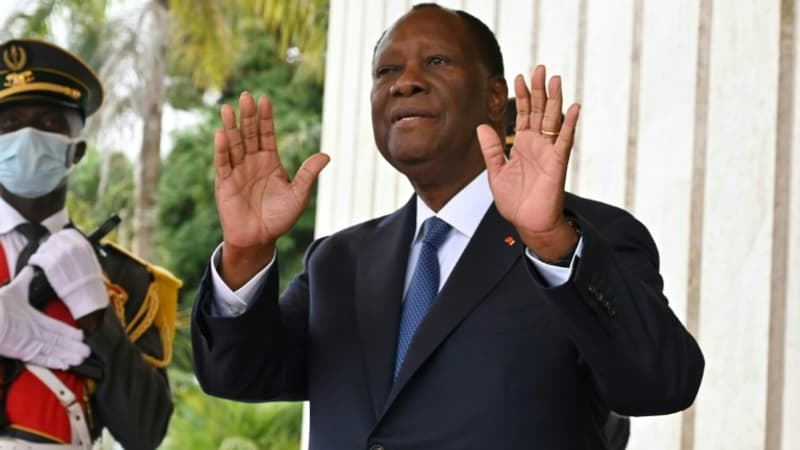Alassane Ouattara is heading towards a fourth term and a landslide victory in the presidential elections in Côte d’Ivoire, the results of which are expected on Monday afternoon, October 27, after a calm vote from which his two main opponents were excluded.
On Saturday, nearly nine million voters were called to the polls in this West African country, a world leader in cocoa production, and which resists the coups d’état and jihadist attacks that shake the region.
The latest results, listed department by department by the Independent Electoral Commission (IEC), are expected at midday, before the winner is announced in the afternoon. The uncertainty is non-existent: Alassane Ouattara, 83, will win with a huge result, according to the results already made public since Sunday. The head of state, in power since 2011, leads in all constituencies.
Low participation and excluded opponents
It was in the north, a predominantly Malinke region, Alassane Ouattara’s ethnic group, where he was successful, as in all presidential elections.
98.44% in Séguela, 99.7% in Kani and its stronghold of Kong, 98.1% in Ferkessedougou or even 97.8% in Sinématiali, each time with a participation close to 100% in these rural areas of the country.
In the south and west, where many offices were deserted on Saturday, participation figures were much lower, but “ADO” is also in the lead, as in Gagnoa, former stronghold of his former rival Laurent Gbagbo, where he obtained 92% but with a participation of 20%.
According to observers, two factors explain this weak mobilization in these regions: the tense political climate that prevailed during the campaign and the absence of the two main opposition leaders, former president Laurent Gbagbo and international banker Tidjane Thiam.
Both were excluded from the polls and removed from the electoral lists, the first due to nationality problems, the second due to a criminal conviction.
“His absence, his calls not to participate in the vote and the climate of tension that has worsened in recent days suggest a significant demobilization of the electorate,” underlines William Assanvo, researcher at the Institute for Security Studies (ISS).
“All legitimacy rejected” by the opposition
Deploring on Sunday afternoon an “international community that remained silent” and a regime “that has established repression and fear (…) as an electoral strategy”, its parties, united in the Common Front, already deny “all legitimacy” to Alassane Ouattara and have demanded new elections.
Nearly 44,000 police were deployed across the country and the government banned Common Front demonstrations in October, making hundreds of arrests, in particular for disturbing public order.
However, four opponents were in the race, including former first lady Simone Ehivet Gbagbo, but none had a chance of advancing to a second round, due to a lack of support from a major party or significant financial resources. One of these candidates, businessman Jean-Louis Billon, has already congratulated Ouattara for his victory in his X account, although alarmed by the “very low participation in certain regions.”
While voting generally proceeded calmly, incidents were reported at 2% of polling places, or about 200 places, according to a police report sent to AFP.
Clashes occurred in several towns in the south and west, but without “significant impact on the conduct of the vote,” according to the Minister of the Interior, Vagondo Diomandé.
The latter had traveled the day before to the Tonkpi region, in the west of the country, and expressed satisfaction on his Facebook account for the “remarkable mobilization during this electoral vote, which took place in calm, peace, security and fraternity.”
Three dead on voting day
Presidential elections are always synonymous with political and inter-community tensions in the minds of many Ivorians, after the elections of 2010 (3,000 deaths) and 2020 (85 deaths).
Two towns in the center-west, Nahio and Nyamayo, in the Haut-Sassandra region, experienced inter-community clashes on the day of the vote that left three dead; security and government sources say that calm returned on Monday.
A 13-year-old teenager also died “from a gunshot” from a public transport vehicle in Gregbeu, another town in the region, according to the security source. In total, eight people have died since mid-October outside the electoral process, four of them on election day, seven according to the opposition.
On Monday, Abidjan returned to near-normal activity after an election weekend in which the capital was unusually deserted.
“Ivorians have said NO to the prophets of doom,” crossed out the front page of Le Patriote, a pro-Ouattara newspaper, welcoming “an Ivory Coast that stands for a peaceful election.” The opposition newspaper Notre Voie points out, on the contrary, “elections that reflect the image of a divided country.”
Source: BFM TV


